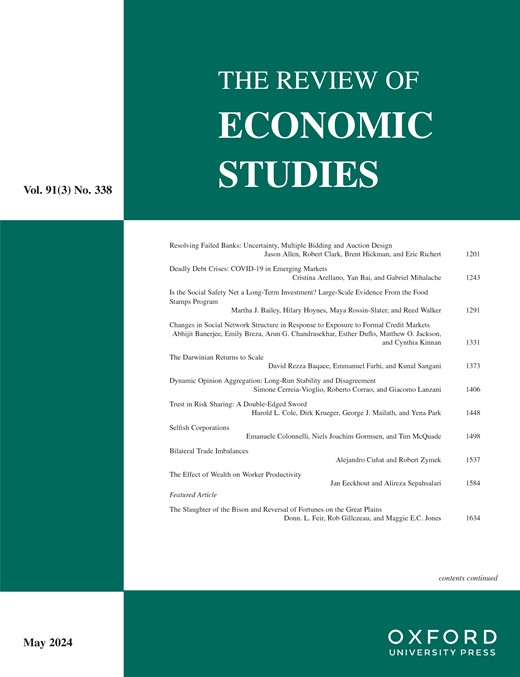Multi-Dimensional Screening: Buyer-Optimal Learning and Informational Robustness
IF 6.4
1区 经济学
Q1 ECONOMICS
引用次数: 0
Abstract
Abstract A monopolist seller of multiple goods screens a buyer whose type vector is initially unknown to both but drawn from a commonly known prior distribution. The seller chooses a mechanism to maximize her worst-case profits against all possible signals from which the buyer can learn about his values for the goods. We show that it is robustly optimal for the seller to bundle goods with identical demands (these are goods that can be permuted without changing the buyer’s prior type distribution). Consequently, pure bundling is robustly optimal for exchangeable prior distributions. For exchangeable priors, pure bundling is also optimal for the seller in the information environment (with the reverse timing) where an information designer, with the objective of maximizing consumer surplus, first selects a signal for the buyer, and then the seller chooses an optimal mechanism in response. We derive a formal relationship between the seller’s problem in both information environments.多维筛选:买家最优学习和信息鲁棒性
多种商品的垄断性卖方筛选买方,其类型向量最初对双方都是未知的,但从已知的先验分布中得出。卖方选择了一种机制,使她的最坏情况下的利润最大化,而不顾所有可能的信号,从这些信号中买方可以了解到他对商品的价值。我们证明,对于卖方来说,捆绑具有相同需求的商品是鲁棒最优的(这些商品可以在不改变买方先前类型分布的情况下进行排列)。因此,纯捆绑对于可交换的先验分布是鲁棒最优的。对于可交换先验,在信息环境(反向时间)下,纯捆绑也是卖方的最优选择,信息设计者以消费者剩余最大化为目标,首先为买方选择一个信号,然后卖方选择一个最优机制作为响应。我们推导出两种信息环境下卖方问题之间的形式化关系。
本文章由计算机程序翻译,如有差异,请以英文原文为准。
求助全文
约1分钟内获得全文
求助全文
来源期刊

Review of Economic Studies
ECONOMICS-
CiteScore
10.40
自引率
3.40%
发文量
75
期刊介绍:
Founded in 1933 by a group of young British and American economists, The Review of Economic Studies aims to encourage research in theoretical and applied economics, especially by young economists. Today it is widely recognised as one of the core top-five economics journals. The Review is essential reading for economists and has a reputation for publishing path-breaking papers in theoretical and applied economics. The Review is committed to continuing to publish strong papers in all areas of economics. The Editors aim to provide an efficient and high-quality review process to the Review''s authors. Where articles are sent out for full review, authors receive careful reports and feedback. Since 1989 The Review has held annual May Meetings to offer young students in economics and finance the chance to present their research to audiences in Europe.
 求助内容:
求助内容: 应助结果提醒方式:
应助结果提醒方式:


